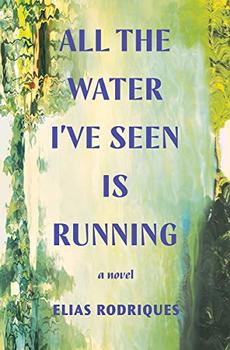Page 3 of 3
There are currently 17 member reviews
for All the Water I've Seen Is Running
-
Cassandra W. (Alameda, CA)
What was the point?
When I reached the last page of this book, I asked myself "What was the point?" I was so looking forward to reading a book from an African-American author I had never heard of. Unfortunately, I was extremely disappointed. The characters were uninspiring and the story was inane. With each chapter, I kept hoping for more as the story plodded along. When I finished the book, I was irritated with myself for wasting my time. Thankfully, I didn't purchase this book.
-
Irene H. (Saugerties, NY)
All the Water I've Seen is Running
Elias Rodriques has the opportunity to use his book, All the Water I've Seen is Running, to explore the visions which his title can awaken in the readers' mind. It is lovely to think that, as our lives progress, we are running toward the sea from which we came.
His protagonist, Daniel, spent his teen years between the Intracoastal Waterway and the Ocean in a small Florida town to which he returns after the death of Aubrey, who was his best friend during his adolescence.
Instead of using location, activity, and dreams to take us through a poetic coming of age story, Rodriques chooses a convoluted plot which often leaves the reader confused as to the reason the scene is included in the book and the impact of the event on Daniel's life.
The author spends the bulk of the book reenacting the events of his youth with his surviving friends in a confusing stream of dialogue which is written in the patios of the poor, economically segregated and racist town in Florida to which he returns. With no clues to the reader as to their importance, he inserts tales of his
difficult family life, his relationship with his father, and the history of his mixed race Jamaican family in among adventures with his now older friends. The reader has to guess what the meaning of specific episodes is in the context of Daniel's life past and present.
Any one of these plot lines would have made a fascinating story about a man emerging from an ethnic group about which we know very little. Instead, the episodes of drunken memory-making lull the reader into simply examining the culture of a small Florida town and the effects of time on its mixed race track team.
It is difficult to tell if Daniel is seeking his true identity during his pilgrimage to Florida, or if he is reliving a life he regrets losing. His insights at the end of the book are poorly connected to his story-telling throughout. And, Aubrey, who clearly harbors depth of character, pops in and out of the story with little context to orient the reader to her presence or importance to Daniel.
A final chapter written in another voice than the author's adds nothing to the book and is puzzling in its inclusion.
Throughout the text, Rodriques demonstrates the ability to write poetically. I hope that he applies that ability in a more disciplined way in his next book.
-
Margot P. (Mandeville, LA)
Message lost in the journey.
Maybe I spent too many years working in a southern high school to appreciate the immature conversations and actions of young people but Rodrigues' characters never seem to develop or mature. As an older adult, I found the conversations ulta tedious and boring. I think he basically took on way too many important topics-racism, poverty, homosexuality, addiction, and speckled them with a touch of global warming and Jamaican history and folklore, all in a novel of only 250 pages. I think an older Daniel with more life experiences returning to Palm Coast to confront his demons would have made for a much stronger story, especially since there is very little plot. I was thinking I would rate the book a 3 for Rodrigues' beautiful and symbolic descriptions of the environment but constant derogatory name calling, drunken conversations and fist fights got in the way. The last chapter was particularly perplexing as he suddenly shifts narrators for no apparent reason.
